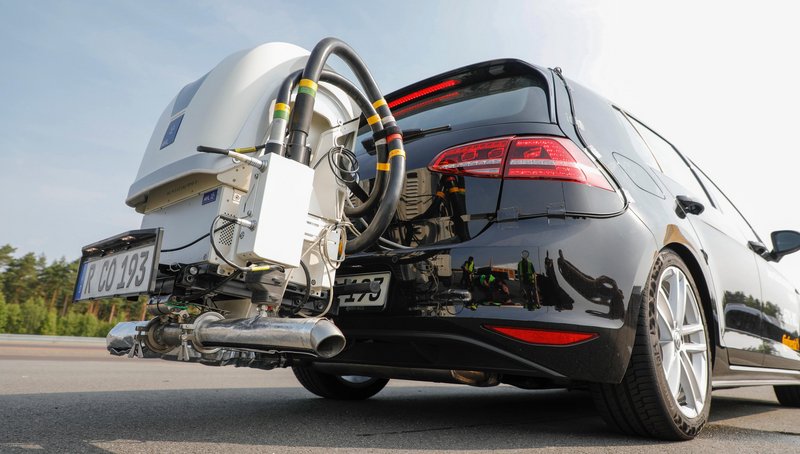Super-Clean Diesel: Democar Showcasing Continental Technologies Tested by VOX-Magazine “auto mobil”
- In a punishing real-world test, “Super Clean Electrified Diesel” records NOx emissions of 46 mg/km – only a fraction of the current and future statutory limits
- High cold-start efficiency: Continental systems achieves urban cold-start emissions of just 11 mg/km NOx
- Test driver Alexander Bloch, VOX TV “auto mobil”, was free to adopt any driving style, see more
Regensburg, December 11, 2018. As the name suggests, Continental’s goal in developing the “Super Clean Electrified Diesel” research vehicle is to demonstrate that “super-clean” diesels are feasible and possible. By equipping a Euro 6b production vehicle with existing Continental technologies, Continental engineers were able to reduce its nitrogen oxide (NOx) emissions to a level well below both the current and future statutory limits – not only in the laboratory but also under real-world driving conditions. Now the Continental diesel vehicle’s “super-clean” credentials have been independently checked and verified – by the VOX TV motoring magazine “auto mobil”. The program’s presenter Alexander Bloch and his team carried out a 100-km road test with the research vehicle that spanned urban, extra-urban and highway driving. Quite intentionally, the test did not follow any pre-defined RDE cycles. Instead, Bloch was free to adopt whatever driving style he wanted, and even reached speeds of up to 180 km/h on the highway. The resulting average NOX emissions were just 11 mg/km in town, and 46 mg/km for the test as a whole. These figures compare with an RDE NOx limit under the new Euro 6d-Temp emissions standard of 168 mg/km. This requirement will then be tightened to 80 mg/km in 2020, when Euro 6d comes into force. Under laboratory conditions meanwhile, the limit is 80 mg/km. The “auto mobil” test was broadcast on the German television channel VOX on Sunday, December 9, at 17.00 h.
Click here for link to the report.
The big challenge: cold-start phases
One of the biggest challenges when attempting to reduce NOx emissions is the cold-start phase – because it is only at higher temperatures that the SCR catalyst develops its full efficiency. Reducing cold-start emissions is therefore a key priority, particularly as far as urban driving is concerned. This is why Continental developed the EMICAT electrically heated catalyst. The heated catalyst brings the downstream-mounted SCR catalyst up to operating temperature – at which point it can start converting nitrogen oxides – only a short time after the engine is started. This has no effect on fuel consumption, since the electrical energy used for heating purposes is supplied entirely by the “48 Volt Eco Drive” system. This mild hybrid system, a further innovative solution from Continental, comprises a lithium-ion battery and a belt-driven starter-alternator. The starter-alternator, which functions as a 12-kilowatt electric motor, serves firstly to recuperate braking energy, which is converted into electricity and stored in the battery, and secondly to assist the internal combustion engine by providing additional power during short, sharp bursts of acceleration. This too reduces NOx emissions, by reducing the peaks in NOx emissions typically produced by diesel engines when accelerating fast and hard. At the same time, the reduced load on the internal combustion engine also reduces fuel consumption and CO2 emissions. Also featured on the research vehicle is the new piezo common-rail injection system. This Continental system further improves cold-start efficiency. Together, these Continental technologies ensure that the “Super Clean Electrified Diesel” is able to achieve average NOx emissions of just 40 mg/km only eight kilometers after starting from cold.
“We take real pride in these test results. They are a clear endorsement of our work in this field, and support our view that diesel technology in combination with the highly efficient SCR system can still make an important contribution to more eco-friendly mobility, both now and into the future. With the ‘Super Clean Electrified Diesel’, we are confirming that Continental already has all the necessary technologies to hand to make this a reality,” says Jürgen Grimm, Head of Engineering Engine Systems at Continental’s Powertrain division.
Incidentally, Continental found itself taking part not just in a test drive but also in an emission “challenge”. The company had set the bar high with its ambitious aim of achieving real emissions of just half the strict laboratory limit of 80 mg/km. But the “auto mobil” team responded with a counter-bet that 40 mg/km would not be achievable. In the end, “auto mobil” did just win that bet – no doubt partly thanks to their test driver’s sporty driving style.

Simone Geldhäuser
Head of Media Relations, Spokesperson Finance, Business and Technology
Vitesco Technologies



